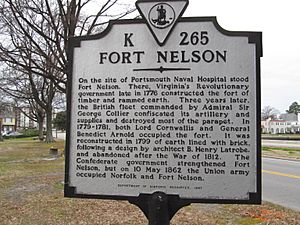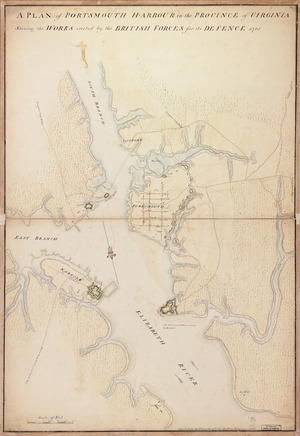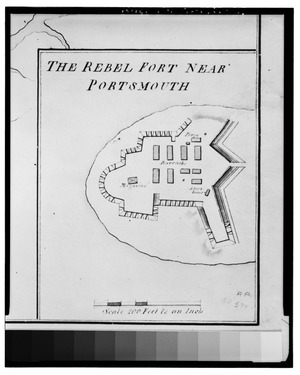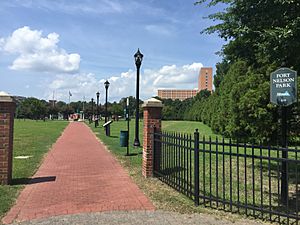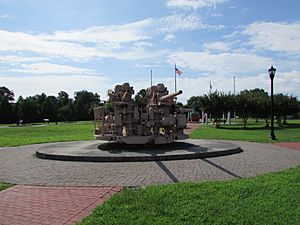Fort Nelson (Virginia) facts for kids
Quick facts for kids Fort Nelson |
|
|---|---|
| Hospital Point, Portsmouth, Virginia | |
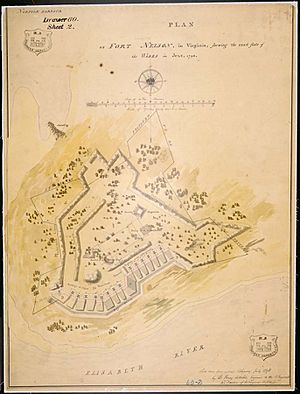
Plan of Fort Nelson as of July 1798
|
|
| Coordinates | 36°50′50″N 76°18′15″W / 36.84722°N 76.30417°W |
| Type | Earthwork |
| Site information | |
| Condition | demolished |
| Site history | |
| Built | 1776 1794–1795 1807–1809 (brick and earth fort) 1861 (earthwork) |
| Built by | Patriot forces United States Army Corps of Engineers Confederate forces |
| In use | 1776–1824 1861–1862 |
| Materials | Brick, earth |
| Demolished | 1827 circa 1865 |
| Battles/wars | American Revolution War of 1812 American Civil War |
Fort Nelson was an important fort located in Portsmouth, Virginia. Today, the Portsmouth Naval Hospital stands on the same spot. The fort was named after Thomas Nelson Jr., who was the governor of Virginia in 1781.
Fort Nelson and Fort Norfolk were built to protect the Elizabeth River. This included guarding the cities of Norfolk and Portsmouth, along with the Gosport Navy Yard.
The fort was first built in 1776 by American forces during the American Revolutionary War. However, British forces destroyed it in 1779. A British map from 1781 shows they rebuilt the fort. After the Revolution, Fort Nelson was rebuilt again in 1794. It was used during the War of 1812. In 1827, the fort was taken down to make way for the naval hospital.
Later, during the American Civil War, Confederate forces rebuilt the fort in 1861. But they left the area in May 1862. The fort was eventually taken down for good around 1865.
Contents
Fort Nelson and the American Revolution
In late 1776, the government of Virginia built Fort Nelson. It was made of wood and packed earth. The fort was designed to hold 150 soldiers. It was built near older defense lines from 1774. Benedict Arnold, who was with the American forces at the time, helped oversee the work. Another fort, which would become Fort Norfolk, was built across the river.
In 1779, a British fleet led by Admiral Sir George Collier attacked. They took the fort's cannons and supplies. The British also destroyed most of its protective walls. The American soldiers left the fort before it was captured.
In 1781, both Benedict Arnold (who had joined the British) and Lord Cornwallis occupied the fort. A British map from 1781 shows that they rebuilt Fort Nelson. It also shows a fort on the site of future Fort Norfolk.
Building the Fort and the War of 1812
Fort Nelson was rebuilt in 1794. It was an earthwork fort with strong corners, called a bastion fort. This was part of the first plan for US coastal defenses. Fort Norfolk was built at the same time. These two forts could fire at enemy ships from both sides of the Elizabeth River.
By 1799, soldiers from Captain Richard S. Blackburn's company were stationed at both Fort Norfolk and Fort Nelson. From 1802 to 1804, Fort Nelson was rebuilt again. This time, it was made of earth lined with brick. The design was by architect B. Henry Latrobe. This was part of the second plan for US coastal defenses. The rebuilt fort could hold 37 cannons and had barracks for one company of soldiers.
In 1807, an event called the Chesapeake–Leopard affair happened near Hampton Roads. This made the military more alert at Fort Nelson. Heavy cannons were moved to the fort. By the end of 1809, Fort Nelson had been made stronger. It had 33 cannons ready for use.
Fort Nelson itself never saw direct fighting during the War of 1812. However, soldiers were stationed there. A long chain was stretched across the Elizabeth River between Fort Norfolk and Fort Nelson. This was to stop the British fleet from attacking the Gosport Navy Yard, Norfolk, or Portsmouth.
The British were stopped in the Battle of Craney Island and did not enter Norfolk. But they did sail up Chesapeake Bay to burn Washington, D.C.. They also tried to attack Baltimore. This happened because there were no forts guarding the mouth of the bay. This led to the building of Fort Monroe in the 1820s. Fort Monroe was built to block enemy ships from entering the bay.
Because of Fort Monroe, the forts on the Elizabeth River became less important. Fort Nelson was no longer used after 1824. It was torn down in 1827 to build the naval hospital. Many of the fort's bricks were used to build the hospital.
Fort Nelson in the American Civil War
During the Civil War, the Confederate government rebuilt Fort Nelson. It became a battery with 18 cannons. However, the Union army took control of Fort Nelson on May 10, 1862. This happened when Confederate forces left the Norfolk area.
It is not clear exactly when the fort was abandoned and torn down. It was likely around 1865, after the Civil War ended.
Fort Nelson Today
Today, there are no visible remains of Fort Nelson. In 2006, Fort Nelson Park was opened. This park is south of the hospital property. It is a public area that remembers the historic fort. The park has several naval guns and other items related to ships. The Fort Nelson Chapter of the Daughters of the American Revolution is also named after the fort.
 | Delilah Pierce |
 | Gordon Parks |
 | Augusta Savage |
 | Charles Ethan Porter |




